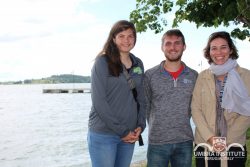Umbra Professor Conducts Innovative Research at Lake Trasimeno with Students

 Inspired by a field trip with one of her classes, Umbra professor Dr. Brooke Porter decided to conduct research on the fishermen and the impact of fish biodiversity at Lake Trasimeno, 30 minutes away from Perugia. On the field trip, Dr. Porter noticed that the fishermen lamented about the introduction of goldfish to the lake while at the same time celebrating a recent catch of largemouth bass, another introduced species. “This dissention made me think about how the fishers identify with and understand the biodiversity of the lake,” Dr. Porter said. She added that “the aim of the research is to unpack the understanding of fisherfolk of fish biodiversity in Lake Trasimeno.”
Inspired by a field trip with one of her classes, Umbra professor Dr. Brooke Porter decided to conduct research on the fishermen and the impact of fish biodiversity at Lake Trasimeno, 30 minutes away from Perugia. On the field trip, Dr. Porter noticed that the fishermen lamented about the introduction of goldfish to the lake while at the same time celebrating a recent catch of largemouth bass, another introduced species. “This dissention made me think about how the fishers identify with and understand the biodiversity of the lake,” Dr. Porter said. She added that “the aim of the research is to unpack the understanding of fisherfolk of fish biodiversity in Lake Trasimeno.”
Dr. Porter used the pile-sorting method to conduct her research, which utilizes physical media (in this case, photos) to generate data from individuals or groups by studying how they organize or “sort” the information. Asking fishermen to sort photos of different Trasimeno fish into groups without further direction, Dr. Porter said that “the nexus of events seemingly offered a perfect application of [this] method.”
Two Umbra Spring 2018 students, Mackenzie Nelsen and Jared Belsky, assisted Dr. Porter on May 14 as she conducted her research to learn more about the pile-sorting method and to see it applied in real time. “The students were able to interact with and observe the fishermen applying to research methods, semi-structured interviews, and field observation,” Dr. Porter said.
 Still in the midst of conducting fieldwork, Dr. Porter presented her preliminary findings on June 9 at the 2018 Food Conference: Perugia hosted by the Umbra Institute. “The results are showing that the economic value of fish is important,” she said. “The data to date has also shown that fishers have a solid understanding of the food web.”
Still in the midst of conducting fieldwork, Dr. Porter presented her preliminary findings on June 9 at the 2018 Food Conference: Perugia hosted by the Umbra Institute. “The results are showing that the economic value of fish is important,” she said. “The data to date has also shown that fishers have a solid understanding of the food web.”
Dr. Porter has also begun writing a journal article to present her findings. She also teaches ESFS 350: Water Essentials: Sustainable Use of a Limited Resource at the Umbra Institute.